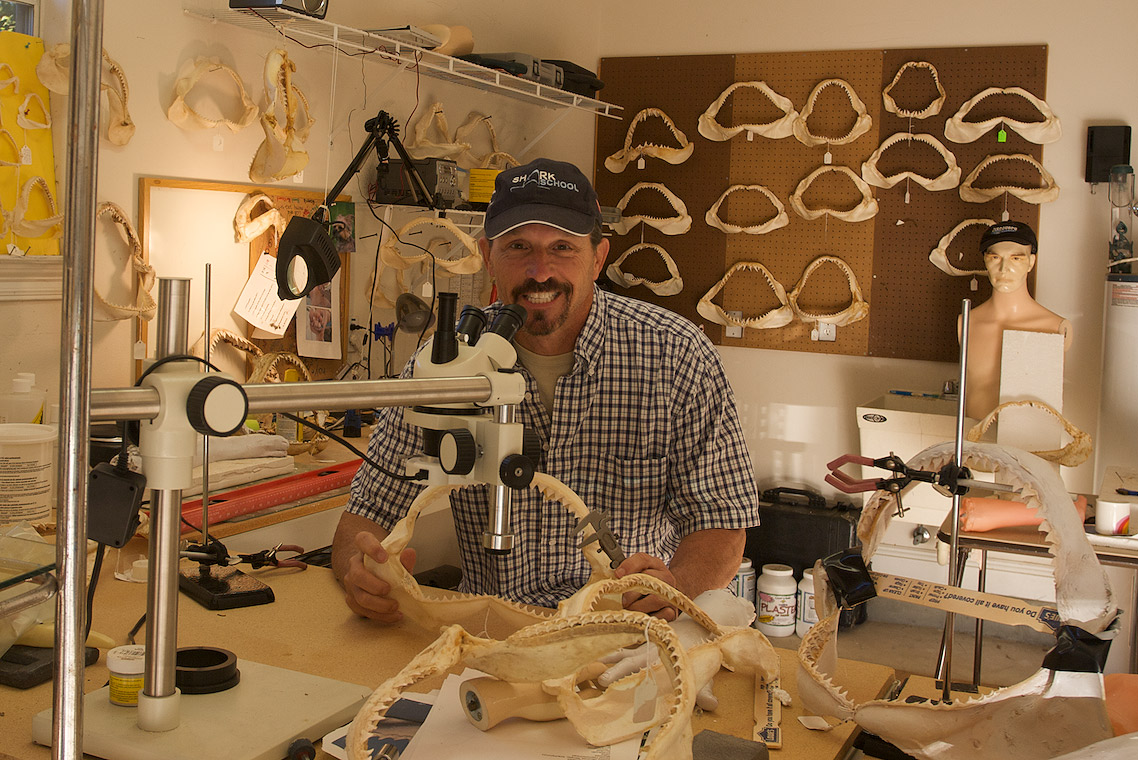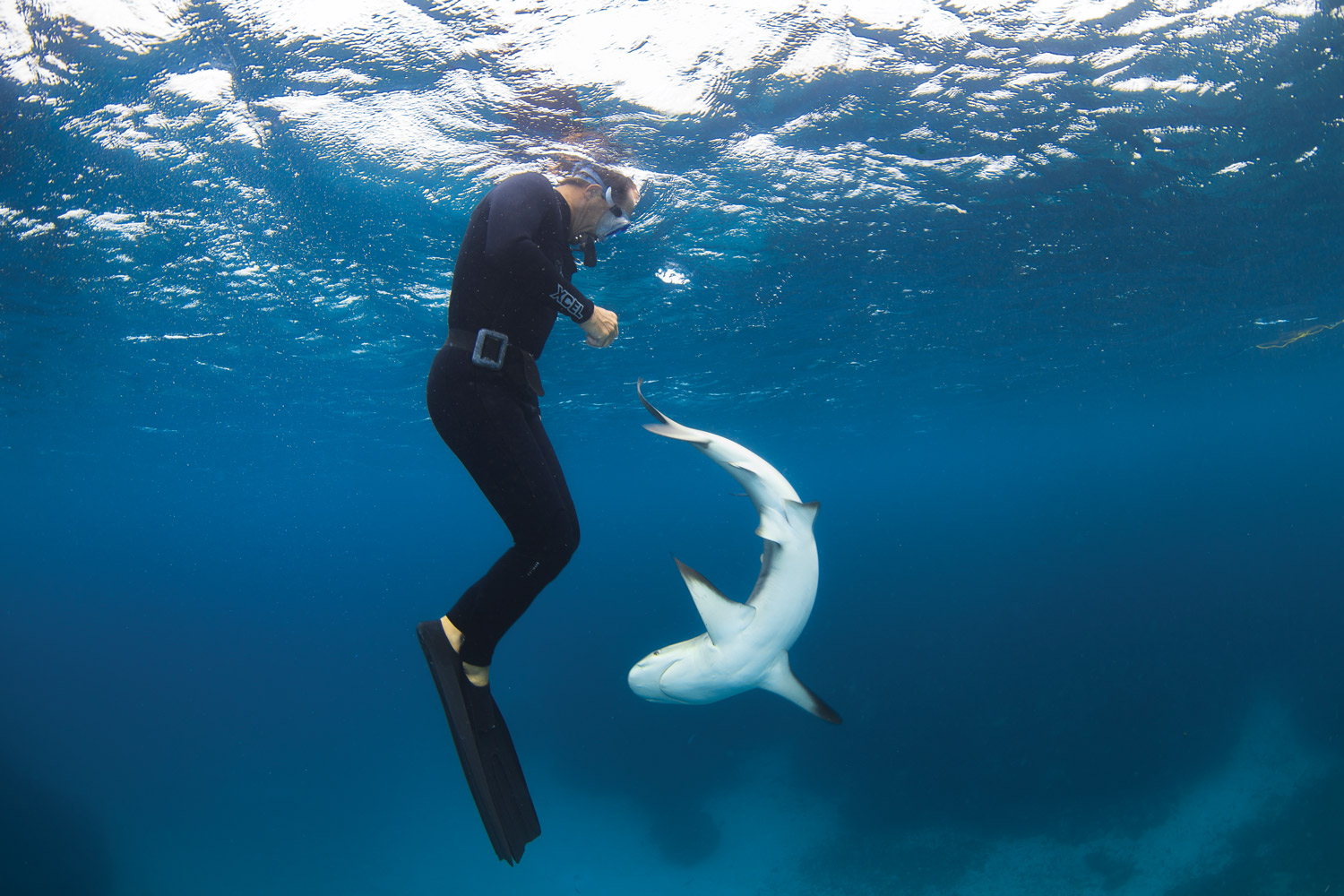Member profile
Learning to love sharks: interview with Erich Ritter
Erich Ritter is the Konrad Lorenz of the sharks. Yes he is: Ph.D. from Zurich University in “Behavioral Ecology” he is the only professional applied shark-human interaction specialist. Ritter’s main expertise is the body language of sharks, with a major interest in shark attacks and their causes. His understanding of potential reasons for shark attacks opened new doors in this fields of research.
Dr. Erich Ritter, age 57 is the head of the SharkSchool™, an institution that teaches how to interact with sharks. He is the executive director of SAVN™, the Shark Accident Victim Network. And a valued DAN Instructor.

– Dr. Ritter, how did the sea enter in the life of a Swiss born young boy?
I grew up with the TV series “Sea Hunt” and “Flipper,” followed by the shows of Cousteau, and the books of Hans Hass. During that time, I was 8 years old, we went to Mallorca, Spain for the first time and I got in touch with sea water. I still remember how excited I was. In addition to, I grew up at lake Zurich, and just fell in love with water…
– And when did you find out to have a real passion for sharks?
It started with the first shark I saw on TV. I was seven years old. I was fascinated that such a creature even existed, but something bothered me from the get-go: the description of the narrator of that show and what I felt did not match. It stirred something in me that I could not explain. When I was 10 years old, I read “Doctor Dolittle,” and from then on I was convinced that humans can talk to animals, and it was clear from then on what I wanted to be when I am grown up. I told everybody who was not yet tired of my fascination that I wanted to be “shark doctor.”
– There are many urban legends about sharks: which is the funniest you heard?
Probably the funniest is that Megalodon is still alive, roaming the oceans’ depths, or that sharks have bad vision, and only see black and white.

– How do you see the future of these fascinating animals?
Very, very grim. The overfishing of sharks is the biggest ecological time bomb that needs to be defused now and here. Although we often hear that it is “5 to 12”- when it comes to the destruction of sharks, it is beyond 12. The damage we have done can’t be fixed with just some reduction of fishing quota but an indefinite worldwide moratorium of any type of shark fishing.
– A ‘wow’ moment in your diving career…
It was during one of my first free-dives with white sharks. The weather was pretty bad (heavy clouds, rain) but we still needed some work done. I interacted with a white shark for about 10 minutes when she approached head-on. I kept focusing on her eyes–important when dealing with sharks–and she eyed me back. When she passed about 1m from me, a sun ray cut through the water and “hit” her right eye. And I saw for the first time that these eyes are not black but blue. A dark and very beautiful blue.
“The damage we have done can’t be fixed with just some reduction of fishing quota but an indefinite worldwide moratorium of any type of shark fishing.”
– And a fear one…
I can’t say I ever feared for my safety when dealing with sharks. Granted, when the visibility is down and one just “feels” there is a (large) shark within a few meters but can’t see it, can be a bit disturbing. Or trying to interact with sharks at night without the use of flashlights, only using moon and star light.
– You are a DAN member and an Oxygen Provider Instructor and since long committed to diver’s safety… which is your personal vision in order to increase dive safety?
I would applaud to a program, mandatory to every novice diver, that teaches how to safely interact with sharks, to make people understand what they do wrong when getting bitten thus educate about prevention. There is no dangerous sharks, but dangerous situation, created by us. Making divers aware and proficient, they could act as the messengers the sharks need too badly. Spreading the word about the true nature of sharks, is probably the single most important fact to get them protected. And the more divers believe in it, and actually felt it while interacting with them, the better the chances for these animals would be. I have never seen a single diver who did not want to talk about sharks to non-divers, letting them know what he or she knows.
“There is no dangerous sharks, but dangerous situation, created by us.”
– Some special tip to divers and free-divers approaching sharks?
If one feels threatened, one should always get in a vertical position, underwater and at the surface, try to move the legs as minimal as possible (sharks compare us with known objects and some pressure wave indicates a “tail of some sort” which will then be investigated, and mouthed on rare occasions), keep focusing on the shark(s) and turn with it/them. Our research showed that sharks stay significantly further away when being in a vertical rather than a horizontal position. Should a shark’s interest be stronger than its natural fear (the animal oversteps its inner circle, inner threshold of hesitation), and be in touching distance (reachable with an outstretched arm, but without bending the upper body forward), I recommend FACE-GUIDE-PUSH-MOVE. Keep facing the shark, guide or push it around or away from you, and if that fails and the shark still comes close(r), move towards the animal. Although sharks don’t know what we are, moving towards them implies some type of predator. Should everything fail and one needs to be more drastic, one should slightly (!) touch the shark’s gills. Again, they don’t know what we are, but understand the signal. Whenever sharks try to kill each other, they go after the gills.

– Your favourite dive-site?
Tiger Beach, Bahamas. I love Tiger Beach for the variety of sharks and, especially there, I can hang out with tiger sharks, one of the biggest babies put there. Tigers are totally misunderstood. They are just like big Danes which also think they are lapdogs.
Erich Ritter facts
- PADI Instructor
- DAN Oxygen Provider Instructor
- Ph.D. from Zurich University in “Behavioral Ecology”
- Post-doc at the University of Miami’s Rosenschiel School
- Head of SharkSchool™
- Chairman of SAVN™ Shark Accident Victim Network, a non-profit organization to help shark victims
- Starring the cult movie Sharkwater, winner of 40 international awards, with Paul Watson (Sea Shepherds) and
- Investigator for GSAF – Global Shark Attack Files
http://sharkvictimnetwork.org/

